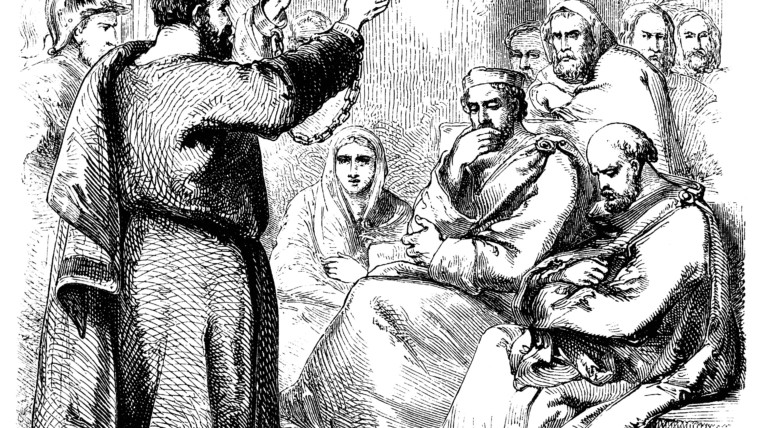Did Jesus (Yeshua) Start A New Religion?
by Christine Egbert
Translation errors create big problems, even seemingly inconsequential mistakes like rendering a phrase written in the “future-perfect” tense as if it had been penned in “past-perfect”. This is exactly what happened when the KJV (as well as some others) translated Matthew 16:19 as: “And I will give unto thee the keys of the kingdom of heaven, and whatsoever thou shalt bind on earth shall be bound in heaven, and whatsoever thou shalt loose on earth shall be loosed in heaven.”
The passage should have been rendered (and it is in the Literal Translation) as “whatever you bind on earth shall occur, having been bound in Heaven. And whatever you loose on the earth shall be, having been loosed in Heaven.”
This LTV is consistent with the Greek “estai dedemenon” and “estai lelumenon,” which are in the periphrastic “future” (not the past-perfect) tense. Literally, it means “shall be, having (already) been bound,” and “shall be, having (already) been loosed.” When correctly translated this passage remains consistent with God’s warning not to add to or take away from his Word, and with the Lord’s Prayer, which says: “Thy will be done on earth as it is in heaven.”
Jesus (Yeshua) never gave Peter the right to change His Father’s established Law (as the Catholic Church claims). Jesus (Yeshua) fully expected Peter—just like He expected Moses—to govern in accordance with His Father’s instructions and not to make up his own as the Roman Catholic Church has been doing since the 4th Century onward. For as Psalms 111:7-8 says, “His commandments, all His judgments, are sure. They stand fast forever and ever.” These are the keys to God’s Kingdom.
Was Peter Rome’s First Pope?
The Roman Catholic Church claims that it is the continuation of the Messianic community first established by Jesus (Yeshua). Their Popes, they claim, are not only Peter’s successors, but the “head” of the worldwide Christian Church, who stand in place of the Messiah. Thus, every Pope bears the title “Vicar of Christ on Earth”.
What Does Scripture Say?
Scripture tells us that Paul went to Rome after being imprisoned for two years (between 59 and 60 CE) in Caesarea, under the reign of Governor Felix. Acts 28:17-22 tells of Paul’s first meeting with some members of Rome’s Jewish community. Let’s read it, picking up in Acts 28:21.
Acts 28:21 – The Jews answered Paul, “We have received no letters from Judea about you. None of our Jewish brothers who have traveled from there brought news about you or told us anything bad about you. We want to hear your ideas. We know that people everywhere are speaking against this new group.”
In Peter’s exchange with the Jewish leaders of Rome, we learn that Peter had never gone to Rome before this encounter. In Matthew 10:5-23, Jesus (Yeshua) instructed Peter and the other disciples to go to the lost sheep of the house of Israel. And in 1 Peter 1:1, Scripture tells us that Peter was an apostle to the elect who are sojourners of the Dispersion (Israel’s scattered lost sheep) in Pontus, Galatia, Cappadocia, Asia, and Bithynia. And in Galatians 2:7-9, we learn that it was Paul who was entrusted to spread the gospel to Gentiles. Peter was sent to bring the gospel to the Jews.
How This Misconception Got Started
In the 2nd century, a man named Irenaeus wrote a book titled Against Heresies, in which he claimed that both Peter and Paul established the church in Rome. Wanting Rome to be made the sole authority, the epicenter for all Christianity, he asserted “preeminence” for Rome’s congregation, exalting it above all others.
In Book III, Chapter 1, Irenaeus wrote, “Peter and Paul were preaching at Rome, laying the foundations of the Church.” Irenaeus, in Chapter 3, went on to say, “…of the very great, the very ancient, and universally [Catholic] known Church founded and organized at Rome by the two most glorious apostles, Peter and Paul…it is a matter of necessity that every Church should agree with this Church, on account of its preeminent authority.”
Irenaeus’ writings laid the groundwork for Constantine in the 4th century to change the 7th day Sabbath to Sunday, to outlaw all of the LORD’s (Yahweh’s) Feast Days (Appointed Times, starting with Passover), and to incorporate days which pagans were already celebrating (Easter and Christmas, called Saturnalia) into Christianity.
What Motivated These Changes?
Thirst for power motivated these unbiblical changes. But power was not Rome’s only motivation. The other driving force was antisemitism. In Eusebius’ Life of Constantine, Vol III Ch. XVIII, it says:
“Let us then have nothing (no Torah, no Feast Days, no Sabbaths, and certainly no dietary laws) in common with the detestable Jewish crowd, for we have received from our Savior a different way.”
Constantine was right. His way was a different way. Only it did not come from the Savior of Scripture. The God of the Bible never changes! Israel’s promised Messiah did not start a new religion called Christianity. In fact, the word Christianity is not found in Scripture, only the word Christian, which appears three times (Acts 11:26; 26:28; & 1 Peter 4:16).
The Greek word translated as Christian is Strong’s G5546 “Christianos’” (Χριστιανός). It means a follower of Christ, which is G5547 ”Christos” (Χριστός), taken from G5548 “chriō ” (χρίω) meaning anointed. Christ is the Greek form of the Hebrew word Messiah. Furthermore, the word translated as Christian was originally an epithet given to Jesus’ (Yeshua’s) followers.
Who Were These Christians?
Acts 11:19-20 says, “Now they which were scattered abroad upon the persecution that arose about Stephen travelled as far as Phoenicia and Cyprus, and Antioch, preaching the word to none but the Jews only. And some of them were men of Cyprus and Cyrene, which, when they came to Antioch, spoke unto the Hellenists, preaching the Lord Jesus (Yeshua).”
The KJV translates Hellenists as “Grecians,” but the Greek word is Strong’s G1675 “hellēnistēs” (Ἑλληνιστής). According to Strong’s Dictionary hellēnistēs is (now pay attention) a Greek-speaking Jew.
Acts 11:26 is the first of the three (and only three) times the word Christian appears in Scripture. Let’s read it:
“And when he had found him, he brought him unto Antioch. And it came to pass, that a whole year they assembled themselves with the ekklesia (a called-out congregation) and taught many people. And the disciples were first called Christians in Antioch.”
You see, these followers of the Messiah, who were dubbed Christians, were not members of some new religion called Christianity. That nomenclature got codified some 300 years later during the 4th century by the political power of Rome. These Christians were none other than Greek-speaking Jews, Jews who came to faith in their very own Jewish Messiah.
Israel’s Messiah, whether you call Him Jesus or Yeshua, did NOT come to start a new religion. Jesus (Yeshua) came only to speak His Father’s words and to do His Father’s will.
John 12:49-50 – “For I did not speak from Myself, but He who sent Me, the Father, He has commanded Me what I should say and what I should speak. And I know that His commandments are everlasting life. Then what things I speak, as the Father has said to Me, so I speak.”
His Parting Words
Just before Jesus (Yeshua) ascended into heaven, He instructed His disciples to “go and teach all nations to observe all that He had commanded them.” Jesus (Yeshua) never abolished the Torah. He said that those who break and teach others to break the least of His Father’s commandments would be called least in the Kingdom (Matthew 5:17-19). And Paul, in Romans 8:4, taught that we are given the Holy Spirit so that we can fulfill (do) the righteous demands of the Torah.
Tragically, many of the departures from Apostolic doctrine enacted by Gentiles during the 2nd through the 4th centuries have been accepted by mainstream Christianity as “foundational to the faith”, rather than what they are, “departures from Biblical truth.”
This reactionary, anti-Semitic trajectory severed Messianic Judaism (Christianity) from its original God-ordained form. Many Church Fathers, motivated by antisemitism, failed to study that portion of Scripture the heretic Marcion had dubbed “old”. Consequently, these men distanced themselves and their followers from everything they thought of as Jewish. This included instructions ordained by The Most High.
By the 4th Century, in spite of this growing error, there remained Jewish believers, faithful to what Jesus (Yeshua) taught. These believers, known as Netzarim (an offshoot of a branch) faithfully practiced the faith Jesus (Yeshua) had delivered to His apostles. They considered themselves a sect within Judaism. Proof of this is found in the preserved writings of Epiphanius, a 4th Century bishop of Salamis, Cyprus. These Netzarim believed Jesus (Yeshua) was Israel’s promised Messiah and they kept the Torah. According to the historian Epiphanius, these Jewish believers had Matthew’s Gospel written in Hebrew. “For it is clear that they still preserve this in the Hebrew alphabet as it was originally written. (Epiphanius; Panarion 29)
Hebraisms In The Gospels
Hebraisms (sometimes referred to as Semitisms) are linguistic expressions or constructions that appear in non-Semitic languages such as koine Greek. These constructions are ungrammatical in Greek but proper grammar in Hebrew or Aramaic. These Hebraisms are found throughout the four Gospels. Therefore, modern biblical scholarship now believes the Gospels were first written in Hebrew.
So, where are these Hebrew documents today? Some, I am certain, are still hidden in Qumran caves, waiting to be discovered. But most, I am sad to say, have already been destroyed or remain hidden under lock and key in the Vatican.
Dialogue with Trypho
(138–161 CE)
In Dialogue with Trypho, so-called early Church Fathers saw circumcision, the Sabbaths, and God’s Appointed Feast Days as punishments God inflicted on the Jewish people.
“We too, would observe your circumcision of the flesh, your Sabbath days, and in a word, all your festivals, if we were not aware of the reason why they were imposed upon you, namely, because of your sins and the hardness of heart…The purpose of this was that you and only you might suffer the afflictions that are now justly yours…”
But what does God’s Word say?
Circumcision
Genesis 17:11 – And you shall circumcise the flesh of your foreskin. And it shall be a token of the covenant between Me and you.
Genesis 17:14 – And the uncircumcised male child whose flesh of his foreskin is not circumcised, that soul shall be cut off from his people; he has broken My covenant.
Exodus 12:48 – And when a stranger shall stay with you, and desires to keep the Passover to the LORD (Yahweh), let all his males be circumcised, and then let him come near and keep it. And he shall be as one that is born in the land. And no uncircumcised person shall eat of it.
Isaiah 52:1 – Awake! Awake! Put on your strength, Zion; put on your beautiful robes, O Jerusalem, the holy city. For never again shall come to you uncircumcised and unclean ones.
Ezekiel 44:9 – So says the Lord GOD (Yahweh): No son of an alien, uncircumcised of heart and uncircumcised of flesh, shall enter into My sanctuary, or any son of an alien among the sons of Israel.
Sabbaths
Exodus 20:11 – For in six days the LORD (Yahweh) made the heavens and the earth, the sea, and all that is in them, and rested the seventh day. Therefore, the LORD (Yahweh) blessed the Sabbath Day, and sanctified it.
Exodus 31:13 – Speak also to the sons of Israel, saying, truly you shall keep My Sabbaths. For it is a sign between Me and you throughout your generations, to know that I am the LORD (Yahweh) who sanctifies you.
Feast Days
(Mo’ed/Appointed Times)
Leviticus 23:2 – Speak to the sons of Israel and say to them, the Feasts of the LORD (Yahweh), which you shall proclaim holy convocations, even these are My appointed feasts.
Recap of the Council of Nicaea
Jewish believers were not invited to participate in the council of Nicaea. The Council’s decision regarding Passover and Easter began a process, finalized a few decades later at the Council of Laodicea, which tragically severed the “new religion” known as Christianity from its Hebraic roots. The Roman Catholic Church “added to” and “took away from” Scripture. Hijacking the LORD’s (Yahweh’s) authority, the Roman Catholic Church launched the world into the Dark Ages.
To quote Dr. Ron Moseley, from his book Yeshua, A Guide To The Real Jesus & The Original Church, page 39, “Since the first century, the Church, for the most part, has misunderstood the Law, which both Jesus and Paul dearly loved, and by which they both lived…when the early Church gradually moved from Jerusalem to the West, many of the Roman converts who became church leaders retained certain of their pagan practices. As a result, Roman leaders interpreted the Hebrew Scriptures in the light of their Greek background, imposing on the biblical text a non-Hebraic interpretive scheme. This had the effect of foisting incorrect information into the Church’s theology concerning God’s Law, information that was irreconcilable with the Word of God as taught by Jesus and Paul…Paul never attempted to start a new religion that opposed Torah. His arguments that appear to be directed against the Law were actually against misuse of the Law by those who were putting Gentile congregations in bondage, teaching that keeping the Law was required for salvation.”
Biblical Rebuttal to Replacement Theology
Psalms 89:30-37 – If his sons (Israel) forsake My Law, and do not walk in My judgments; if they profane My statutes and do not keep My commandments; then I will visit their transgressions with the rod, and their sins with stripes. But I will not annul My mercy from him, and I will not be false in My faithfulness. I will not profane My covenant, nor change what goes from My lips. Once I have sworn by My holiness; I will not lie to David. His Seed (Israel) shall be forever, and his throne as the sun before Me. Like the moon, it shall be forever a faithful witness in the sky.



